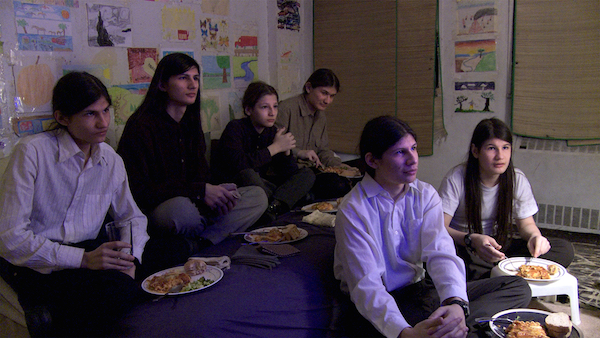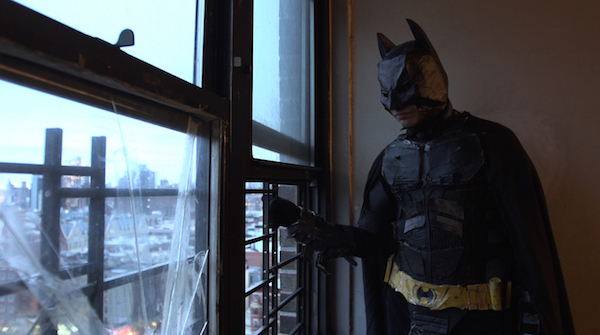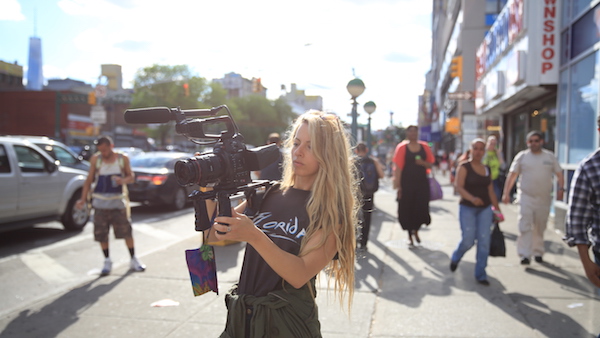Crystal Moselle walked away with the 2015 Sundance Grand Jury Prize for her first documentary feature, THE WOLFPACK, a film that transports us to the fascinating, and by turns, horrifying reality of six brothers. The boys were raised on the lower east side of Manhattan in a four bedroom apartment that they were rarely permitted to leave. They were literally locked up in their home by their father for years at a stretch. Of her first encounter with the brothers, Director Moselle exclaims, “I felt like I had discovered a long-lost tribe from the Amazon.”
Oscar Angulo, a Peruvian immigrant, moved his Midwestern wife and young children to New York City with dreams of breaking into the music industry. He was an idealist who equated working with “being a slave to society.” Oscar rebelled by refusing to work at a traditional job. He felt inspired by the Hare Krishna ideal to sire a tribe of ten children. His wife Susanne attempted to the best of her ability to indulge her husband’s dream, tolerating his eccentric vows of poverty and home-schooling the seven children that they were able to conceive — six sons and one beloved, mentally disabled daughter.
While he was not much of a provider, Oscar was an avid film buff, and he supplied his family with a steady stream of films to watch. These films became their salvation, their sole form of escape. To assuage their boredom, the boys began to type up screenplays, fabricate intricate costumes and props, and recreate films in their entirety, including, The Godfather and Pulp Fiction, among many others.
“It’s fascinating what the human spirit does when it’s confined,” Moselle remarks. The boys’ isolation, which seems to have been as much a side-effect of their poverty as of their father’s fears, fostered within each one of them a remarkably developed creativity. Moselle takes us deep into their den, to witness their private rituals and to reflect upon their most unorthodox upbringing.
Moselle’s timing in capturing this story was kismet. She met up with the brothers when they had just begun venturing outside the confines of their home to explore the world at large together. The youngest, Jagadisa, was eleven, and the oldest, Bhagavan, was just eighteen. Navigating the streets of lower Manhattan in their Reservoir Dogs-inspired get-ups, they resembled a wolf pack on the prowl. Moselle captures their awakening, their first steps, as it were: Govinda as he relishes the first bite of an apple from the tree of knowledge on a virgin family outing; the brothers’ unorthodox baptism as they take a first dip in the Atlantic Ocean at Coney Island.
Whether the boys will ever choose or be able to fully assimilate as part of the larger fabric of American capitalistic society, with homes and families of their own, remains to be seen. How they will reconcile their father’s idealistic notions about work with the harsh realities, remains to be seen. This is a film that raises many questions and trusts in its audience to wrestle with implications of the considerations it provokes.
The dissonance between what these at once culpable and naive parents had imagined for their children versus what they were able to provide is tragic. Yet there is an optimism in the telling, that beyond the odds, the Angulo brothers will find a way to not only survive their upbringing, but to thrive. To spin their idiosyncratic childhood, to weave for themselves an extraordinary, rich, and unconventional future.

in THE WOLFPACK, a Magnolia Pictures release. Photo courtesy of Magnolia Pictures.
Sophia Stein: You’re walking down First Avenue, when you notice these young men with waist length hair, wearing Ray-Bans, dark suits and skinny ties – one, two, three … you count six of them running past you down the street. Did you immediately recognize that they were referencing Reservoir Dogs with their style of dress?
Crystal Moselle: I think that I was more concerned with their hair.
Sophia: What was that first conversation like?
Crystal: I just asked them where they were from. “Delancey Street.” “Are you guys all brothers?” I asked. “Yes.” They were a little bit shy, and then Govinda asked me, “What is it that you do for a living?” I told him that I was a filmmaker. “Oh, we’re interested in getting into the business of filmmaking,” he said. “Maybe I can show you some cameras, and we can hang out and talk about movies,” I offered.
Sophia: So when the family moves to public housing on the Lower East Side of Manhattan back in 1994, their father decides that it is too dangerous for any of them to be permitted to leave the apartment on their own. The only time that I have ever personally experienced being locked in, in that way, was when I stayed with my brother-in-law in Mexico City. My husband and my brother-in-law refused to let me to go out on my own, insisting that it was too dangerous, that I might be kidnapped – which I thought was hysterical. Then I discovered that we were actually locked in the apartment. The apartment was locked from the inside at all times; you needed a key to open the front door. So when I saw your film, it got me wondering: Do you think Oscar Angulo’s mentality is culturally conditioned at all?
Crystal: I had actually thought about that. They came to New York City straight to the projects. While they were living there, somebody got shot outside their doorstep. It was just scary to them. It was even scary for Susanne who was from the Midwest. She didn’t want to come to New York; she was just going along with her husband’s plan, hoping that it would work out.
Sophia: Did you feel unsafe visiting them in their home?
Crystal: When I first started going, I did feel unsafe. But then once I got to know the lay of the land, the people and the building, I didn’t. Also, my ex-boyfriend used to live in the projects. One of our producers felt threatened when she went there, out of her element. If it’s not what you’re used to, it can feel scary.
Sophia: Such isolation was difficult for the boys. They found salvation through movies, watching films at home and reenacting them. At one point, Govinda confides: “If I didn’t have movies, life would be pretty boring, and there would be no point at going on.” As a filmmaker, is this a sentiment that you identify with personally?
Crystal: (nervous laughter – Huh, huh, then considering Govinda’s proposition) “If it wasn’t for movies, life would be pretty boring, and there wouldn’t be a point in going on …” Um – no, I don’t agree with that. I find all my inspiration in real life. Even though I love films and sometimes feel like I need to be taken away to a different world. I recognize that movies can be very therapeutic. I am most inspired, however, by real life.

Photo courtesy of Magnolia Pictures.
Sophia: The brothers went to great lengths to create wonderful costumes and props for their reenactments. At one point, Mukunda models a Batman costume that he constructed completely from yoga mats and cereal boxes. Is he working in costume design now?
Crystal: He’s creating more films. He is PAing on different projects, and sometimes he is working in the art department.
Sophia: In the end of your film, we see Mukunda at work directing a short film – a masquerade of sorts, an examination of his own feelings. It is quite magical. That was such a poetic and gorgeous way to end your film. How did you discover that ending?
Crystal: I filmed quite a few of their productions, but this was the piece where I felt like Mukunda grew up and was able to tap into himself to draw upon some of his deepest emotions. It was very pure that way.
Sophia: You film a Halloween ritual that they perform. Do they actually build a bonfire in the middle of their living room for that ritual?
Crystal: It was actually a scarecrow that was hanging from their ceiling. They burn it, and then douse it with water afterwards, while playing that song, “This Is Halloween,” from The Nightmare Before Christmas. I did not film that. They actually filmed that.
Sophia: Mukunda was the first brother to leave the apartment. How did you approach recreating his point of view on that inaugural journey?
Crystal: He was along for that shoot, explaining what was happening, and I was exploring his neighborhood with him with the camera.
Sophia: Did he do any shooting himself? Was he ever behind the camera?
Crystal: Yeah, absolutely. They all shot footage actually. They would give me little presents. One time they were whispering something about some “party time” thing, and I was like, “What’s party time?” And they were like, “Ah, we can’t talk about party time.” And I was like, “O.k. Well, can I ever come to party time?” And they were like, “Umm … nah.” Mukunda gave me a video card, and it was party time. I was so excited. That’s the scene where they’re dancing around to “Tarzan Boy.” Then another great time he gave me a card, he had filmed his mother speaking to her mother for the first time in twenty years. That was a pretty amazing present. And it was free! Just amazing …
Sophia: Mukunda was the first brother to leave the apartment, but he was not the first to move out. Govinda is the only brother to date who has moved out and is living on his own. What is it about Govinda that allowed him to take that risk, do you think?
Crystal: This was his rebellion. He found the power inside himself to go out on his own and to do what he wanted to do. He wasn’t listening to his father anymore. He was over it.
Sophia: Do you think the other boys will ever individuate to that degree? Do you think that they will move out and build homes and lives for themselves outside of that tribal family setting?
Crystal: It’s already happening. They are all doing amazing things. Govinda is working as a camera assistant on commercials and documentaries. Bhagavan is a yoga instructor and works with a theatre group. Narayana is an activist working with this company called NYPIRG on this major anti-fracking campaign. Mukunda, the one who is shooting all these great short films, is working at a production company. The youngest ones are still in high school, being home-schooled by their mom. They love the 80s, and they’re into music, just like their dad. There is a lot going on.

a Magnolia Pictures release. Photo courtesy of Magnolia Pictures.
Sophia: You were a real catalyst in all of their lives. How active were you in encouraging them to explore new experiences?
Crystal: I think I was their soundboard. They would ask me things like, “Where’s a beach around here?” And I would be like, “You should go to Coney Island.” Initially, I was more involved, but then as they got older, it was more about them and what they were doing. I just kind of followed their transformation.
Sophia: You shoot them visiting an apple orchard for the first time. That symbolism is profound. It is such a therapeutic trip for them all. What inspired that idea?
Crystal: They went upstate for a photo shoot. They just loved it so much and thought it was so beautiful that they wanted to bring their mother up there. All of them together.

Photo courtesy of Magnolia Pictures. Photo credit Megan Delaney.
Sophia: When you started working with them, they were young teenagers. You’re an attractive filmmaker, and I would imagine that some, if not all of the boys, fell in love with you. How did you navigate those types of coming of age feelings with them?
Crystal: I think that they saw me as a mentor, an older sister.
Sophia: I was wondering if the filmmakers who influenced the boys so profoundly—Quentin Tarantino, Christopher Nolan, David Lynch, Martin Scorsese—have any of them been able to see the film yet? Have they contacted you about it?
Crystal: They all know about it and will hopefully be seeing the film soon.
Sophia: Some of The Wolfpack men are such talented actors – I found myself wondering if they will be approached as a result of participating in your documentary to do some acting work. Perhaps your film will provide just the professional breaks they could all use!
Top Image: Krsna, Jagadisa, Bhagavan, Mukunda, Narayana and Govinda Angulo in THE WOLFPACK, a Magnolia Pictures release. Photo courtesy of Magnolia Pictures.
THE WOLFPACK – Official Website
Now available on iTunes
